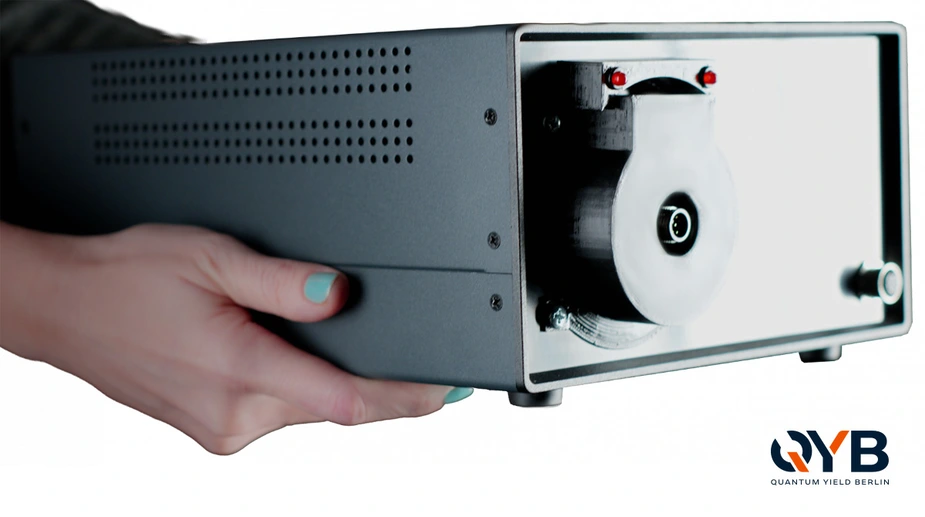Faster development of efficient solar cells and LEDs thanks to LuQY Pro
HZB spin-off QYB Quantum Yield Berlin is launching a measurement instrument for optimising optoelectronic components
Scientists from the Helmholtz Innovation Lab HySPRINT at HZB spun off the technology company QYB Quantum Yield Berlin GmbH at the beginning of April 2021. The spin-off is launching LuQY Pro, a ready-to-use measurement instrument that can help develop and optimise optoelectronic components such as solar cells and LEDs in a more efficient and resource-saving manner.
Making semiconductor materials for solar cells and LEDs energy-efficient is an important prerequisite for the energy transition. However, the process of finding the optimal materials for this and combining them in the best possible way to create components is often itself very resource-intensive. This is because it is necessary to repeat the fabrication processes and measurements – which requires large amounts of time and energy.
“We have developed an instrument and software that very quickly provides meaningful information about where an optoelectronic component can be made even more efficient”, says Lukas Kegelmann. The renewable-energy engineer is one of the founders of QYB and heads the company as managing director. “To do this, we measure the absolute luminescence efficiency of semiconductors – that is, how much light they emit when they are excited by light or electrical current.” The shoebox-sized device is called LuQY Pro. The abbreviation stands for luminescence quantum yield (luminescence efficiency).
The underlying analysis method goes back to an idea from the 1980s. Thomas Unold's research group has developed it considerably in recent years at the HySPRINT Laboratory and optimised it for thin-film materials. “We have been working a lot In my group on making research more effective and more focussed for quite some time”, says the physicist, who is one of the founders and shareholders of the company together with Lukas Kegelmann, Amran Al-Ashouri, Aboma Merdasa, José Márquez, and Steve Albrecht. “That is why I am very pleased that our efforts are now finding such resonance and that LuQY Pro will soon be employed by an increasingly large group of researchers.” Through close collaboration with the University of Potsdam, researchers headed by Dieter Neher have also contributed to establishing the measurement method and will continue as scientific advisors to the spin-off. The young company's measurement instrument is primarily oriented towards research and development departments at scientific institutes, universities, and industry.
The founders were supported by the Technology Transfer and Innovation Department of the Helmholtz-Zentrum Berlin on their journey from the original idea to founding the company, building the first prototype, and signing the shareholder agreement. “I know from my experience in technology transfer that it is important for the success of a young company to know what the market needs”, says Jan Elmiger. He is responsible for technology transfer at the HZB and has been advising the spin-off for two and a half years. “Lukas Kegelmann and his comrades-in-arms internalised this extremely quickly and the prototype they developed is an instrument that meets all the requirements of the market.” The support of the HZB was essential for the founding team. “The Technology Transfer and Innovation Department helped us enormously with advice and know-how – from conception to the founding of the company”, says Kegelmann. “Without financial resources from the Technology Transfer Fund and the Helmholtz Association's Field Study Fellowship, we would have had little financial leeway and probably wouldn't have taken the risk of building a prototype in the first place.”
While the first commercial device is to be sold and delivered this summer, the founders are already working on future products. With an extension of the existing system, they also want to allow the analysis of components with several photoactive semiconductors, e.g. so-called multi-junction solar cells.
QYB Quantum Yield Berlin GmbH is a spin-off of the Helmholtz Innovation Lab HySPRINT at HZB. The technology company has developed LuQY Pro, a ready-to-use measurement and analysis system that can quickly and precisely measure the efficiency of thin-film semiconductors, optoelectronic components, and complete devices under various operating conditions. The founders' mission is to provide others in research and industry with an instrument that can be used to optimise semiconductor composition in the most resource-conserving way possible.
Founder / Associate: Lukas Kegelmann, Amran Al-Ashouri, Aboma Merdasa, Steve Albrecht, Thomas Unold, José A. Márquez
The Helmholtz Innovation Lab HySPRINT is a collaborative platform for industry at Helmholtz-Zentrum Berlin. Its focus is on optoelectronic materials and devices at an early stage of technological development. The platform offers its industrial partners access to all the relevant technological processes and characterisation methods in its state-of-the-art laboratories at the Berlin-Adlershof Technology Park. With its innovative team of experts, it dynamically drives product development forward, facilitating more rapid entry into the market.
The Helmholtz-Zentrum Berlin für Materialien und Energie GmbH (HZB) develops and operates large-scale facilities for research with photons (synchrotron radiation) with internationally competitive and even unique experimental capabilities. These experimentation facilities are used by more than 2500 guests from universities and non-university research institutions worldwide every year. The Helmholtz-Zentrum Berlin also conducts in-house materials research for energy technologies. In solar energy research, the development of thin-film solar cells is a prime focus. Around 1100 staff work at HZB.
HZB is a member of the Helmholtz Association of German Research Centres, Germany's largest scientific organisation.
Contact:
Helmholtz-Zentrum Berlin für Materialien und Energie
Young Investigator Group Perowskite Tandem Solar Cells
Dr. Lukas Kegelmann
Phone: +49 30 8062-41312
Email: lukas.kegelmann(at)helmholtz-berlin.de
Helmholtz Innovation Lab HySPRINT
Sophie Spangenberger
Phone: +49 30 8062-14992
Email: sophie.spangenberger(at)helmholtz-berlin.de
Press release HZB, 23 July 2021
